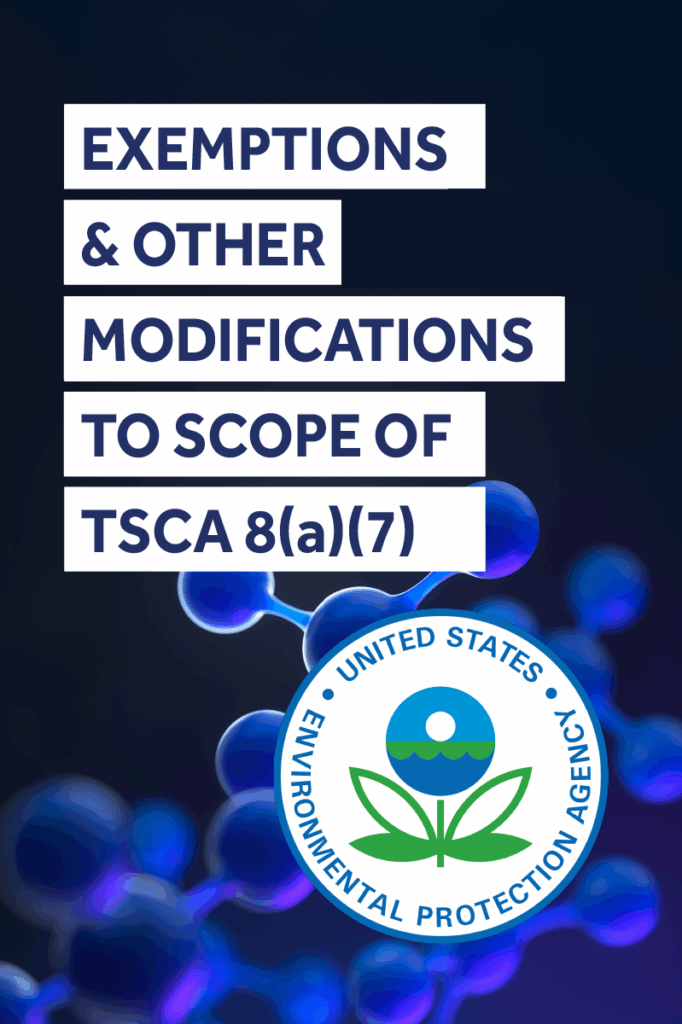TSCA 8(a)(7) PFAS
November 18, 2025 | Written by GreenSoft Technology, Inc.
EPA Releases Proposal to Exempt Some TSCA 8(a)(7) PFAS Reporting Requirements

EPA releases proposal to modify and exempt some reporting requirements under TSCA 8(a)(7)
On November 10, the U.S. Environmental Protection Agency (EPA) released a proposal to modify the perfluoroalkyl and polyfluoroalkyl substances (PFAS) reporting regulations under the Toxic Substances Control Act (TSCA).
The proposed changes aim to reduce regulatory reporting burdens and providing greater regulatory certainty to the industry.
The exemptions and modifications that EPA is proposing would maintain important reporting requirements on PFAS while exempting reporting on activities that manufacturers are least likely to know or reasonably determine. The proposed exemptions are:
- PFAS manufactured (including imported) in mixtures or products at concentrations 0.1% or lower;
- Imported articles;
- Certain byproducts;
- Impurities;
- Research and development chemicals; and
- Non-isolated intermediates.
The EPA is also proposing technical corrections to clarify what must be reported in certain data fields and to adjust the data submission period.
EPA will accept comments on the proposed changes for 45 days after official publication in the Federal Register in docket #EPA-HQ-OPPT-2020-0549 on www.regulations.gov. Final amendments could take effect in mid-2026, ahead of the current 2026–2027 reporting deadlines.
The new proposal offers several key exemptions. It would remove the reporting requirement for imported articles, meaning most finished electronics and components containing trace PFAS would no longer be in scope. It also introduces a 0.1% concentration threshold, exempting mixtures and products with very small PFAS content. The reporting look-back period (2011–2022) stays the same
The EEE producers and importers, this proposal represents a significant change. Producers who have imported finished assemblies, components, or other articles (such as cables, housings, PCBs, etc) beteeen 2011 and 2023 would no longer be obligated to report PFAS content under TSCA section 8(a)(7), effectively setting them out of scope for the EPA's TSCA PFAS reporting mandate. However, producers who have imported or produced raw PFAS chemicals or PFAS-containing mixtures would still be required to submit a report.
Overview of TSCA Section 8(a)(7) reporting and recordkeeping requirements for PFAS
In a May 2025 blog post, we reported on the EPA’s April 2025 announcement regatding its approach to implementing TSCA Section 8(a)(7). The agency emphasized its commitment to gathering essential data “as Congress intended,” while aiming to minimize the regulatory burden on small businesses and importers of articles.
This statement signaled that the EPA was actively considering adjustments to the reporting requirements, potentially reducing or removing obligations for smaller entities and, notably, for those importing articles containing PFAS.
This was further confirmed by a September 4 publication of the Trump Administration’s Spring 2025 Unified Agenda from the US Office of Management and Budget (OMB), which stated their plans to propose the incorporation of certain exemptions and other modifications to the scope of the reporting rule. EPA intended to issue a notice of proposed rulemaking (NPRM) for these changes in December 2025 and a final rule in June 2026. Details on that action can be found here.
As it stands, TSCA Section 8(a)(7) reporting and recordkeeping requirements mandates that any company that has manufactured or imported PFAS within the United States, or has imported PFAS-containing articles in any year between January 1, 2011 and December 31, 2022 is required to electronically report information regarding PFAS uses, production volumes, disposal, exposures, and hazards to the EPA.
Originally the reporting window was set to begin in November of 2024, before it was delayed to July 2025. Then on May 13, 2025, EPA announced a further delay, pushing the reporting period start date to April 13, 2026. The current rule will require most reporters to complete all reporting by October 13, 2026. Unless exempt by these new changes, small businesses reporting data solely on importing PFAS contained in articles will have until April 13, 2027 to submit reports.
More information from the EPA on the rule can be found online. Additionally, GreenSoft Technology maintains a PFAS Resource Center with information on PFAS regulations and proposals around the globe, which can be found here.
GreenSoft helps identify PFAS chemicals in your supply chain for TSCA compliance
GreenSoft Technology’s PFAS Data Services solution provides affected companies with the chemical data from their supply chain that is needed to comply with the TSCA Section 8(a)(7) rule.
Our data collection team will contact your suppliers directly to obtain data on the PFAS chemicals contained in your products and components as per the PFAS definition noted in TSCA Section 8(a)(7).
With our Turnkey Service, we can generate the necessary compliance reports for you. Or you can use our GreenData Manager software to manage your company’s substance database and easily generate reports for this and other environmental regulations. Contact us to learn more.

